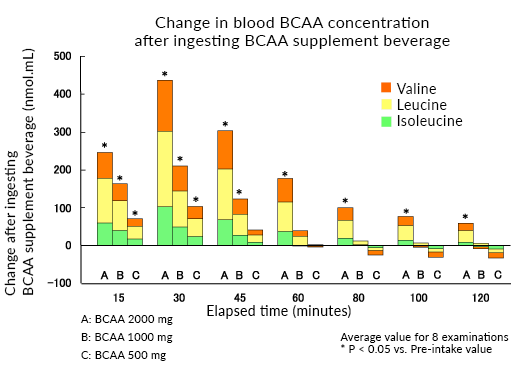Effective Dose of Branched-chain Amino Acids on Blood Response in Healthy Men
Koichiro Hamada, Takashige Koba, Masao Sakurai, Keitaro Matsumoto, Tomoko Higuchi, Kiyoko Imaizumi, Hideki Hayase, Hirofumi Ueno
Journal of Japanese Society of Clinical Nutrition 27(1), 1-10, 2005-08-31
Objective
To determine the amount of BCAA that can sufficiently increase blood BCAA concentration in a single ingestion.
Methodology
Eight healthy adult males took part in a double-blind, crossover* comparison test using beverages containing 6 different levels of BCAA concentration, and a placebo drink.
In test 1, blood BCAA concentration was measured after a single ingestion of the 500 ml BCAA supplement beverages and placebo drink. The BCAA supplement beverages contained either 2000 mg, 1000 mg or 500 mg of BCCA.
- *crossover comparison test: compare the results of each subject, with each subject consuming the drinks in a different order.
Results
After taking the BCAA supplement drink, total blood plasma increased in a dose-dependent manner, with the peak 30 min after ingestion. With drinks containing 1000 mg or 2000 mg of BCAA, the total BCAA concentration in blood plasma was significantly higher than that of those consuming the placebo drink. Compared to the uptake value before ingestion, with the drink containing BCAA 2000 mg, the total blood plasma BCAA concentration remained significantly higher after 120 minutes. However, with beverages containing 500 mg or 1000 mg of BCCA, the total blood plasma BCAA concentration only showed significantly high values up to 30 minutes and 45 minutes following intake (respectively).
Conclusions
It was found that beverage intake tests using drinks containing more than 2000 mg of BCAA, compared to beverages containing 500 mg and 1000 mg,
1) further increase blood BCAA concentrations;
2) maintained the elevated blood BCAA concentration for a longer period.
Therefore, it was presumed that the intake of 2000 mg or more of BCAA is highly likely to have a greater physiological effect.










